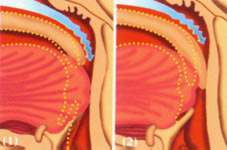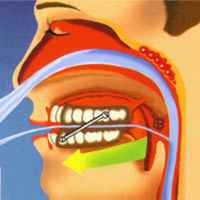|
|||||||||
|
|
|||||||||
| Snoring | ||||||||||||||||||||||||||||||||||||||||||||||||||||||||||||||
|
Malposition of the mandible, especially backward, may accentuate breathing problems during sleep. DO YOU HAVE A QUIET SLEEP OR ARE YOU A SNORER, TOO? Apart from the fact the the noisy nocturnal sound produced by a snorer is maddling for a couple relation, snoring is not a rare problem today: indeed, 60% of men and 40% of women above 60 are snorers. These percentage rates drop to 10% and 5%, respectively, in thirty-year-old individuals. According to the latest scientific studies on this question, snoring - in less young people - would entail a high risk factor for their overall health. Furthermore, it was proven that this type of trouble might reduce even severely a snorer's lifetime . TWO DIFFERENT SNORING FORMS Snoring with no breathing suspension (apnea) certainly disturbs sleeping patterns, but is not harmful. However, sleep conditions considered as "hazardous" are characterized by temporary breathing suspensions followed by wheezes or noisy sounds of snoring due to breath resumption . WHAT CAUSES SNORING? The noisy sound of snoring is caused by vibration of the temporarily relaxed musculature of the upper airways: the soft palate and the oropharyngeal mucosae are vibrating. During sleep, the tongue musculature may completely collapse posteriorly into the pharynx, thus causing an obstruction for a few seconds: this will produce a total breathing suspension. In overweight persons of both sexes, even in young age, fat accumulation causes narrowing of the airways, resulting in : |
||||||||||||||||||||||||||||||||||||||||||||||||||||||||||||||
|
1) accelerated airflow
|
 |
|||||||||||||||||||||||||||||||||||||||||||||||||||||||||||||
|
Obstruction
of the airways during sleep, due to collapsibility of the tongue
(1) and of the soft palate (2)
|
||||||||||||||||||||||||||||||||||||||||||||||||||||||||||||||
|
The
administration of certain drugs (including tranquillizers and sleeping
pills) as well as the consumption of too fatty food or alcohol intake
in the evening will exacerbate this disorder.
|
||||||||||||||||||||||||||||||||||||||||||||||||||||||||||||||
|
BENEFICIAL REST When snoring is not a health-hazard, your dentist may provide an "anti-snoring" device: it is quite similar to a customer-designed orthodontic appliance. It has the specific function of causing a forward displacement of mandible and tongue. Thanks to this movement, the oropharyngeal cavity will be open, which allows to restore normal respiration. |
 |
|||||||||||||||||||||||||||||||||||||||||||||||||||||||||||||
|
Anti-snoring
device: it causes a slight forward displacement of the lower jaw
and of the tongue, so that the airway passage will be free
|
||||||||||||||||||||||||||||||||||||||||||||||||||||||||||||||
|
DO YOU HAVE ANY RESPIRATION PROBLEMS DURING SLEEP? Well, answer the following questionnaire: it will help your dentist understand whether it is a "noxious snoring" or whether a severe hazard for your health is suspected, for example sleep apnea. |
||||||||||||||||||||||||||||||||||||||||||||||||||||||||||||||
|
||||||||||||||||||||||||||||||||||||||||||||||||||||||||||||||
|
||||||||
